- Home
- Fannie Flagg
Fried Green Tomatoes at the Whistle Stop Cafe Page 3
Fried Green Tomatoes at the Whistle Stop Cafe Read online
Page 3
Mrs. Biddie Louise Otis announced today that she was going to take the meteorite that came through her roof last week down to the cafe so people would stop calling her up about it, because she is busy moving. She said that it is nothing but a big gray rock, but if anyone wants to look at it they can.
Idgie says to come on in the cafe whenever you want to and she will have it on the counter.
Sorry I don’t have more news this week, but my other half, Wilbur, has the flu and I’ve had to wait on him hand and foot all week.
Is there anything worse than a man that’s sick?
We are sorry to report that our beloved 98-year-old Bessie Vick, Bertha’s mother-in-law, died yesterday, of what was thought to be old age.
… Dot Weems …
DECEMBER 22, 1985
The next Sunday, when Evelyn came to the visitors’ lounge, Mrs. Threadgoode was sitting in the same chair, wearing the same dress, waiting for her.
Happy as a lark, she continued the conversation about the Threadgoode house as if they had never been apart, and there was nothing Evelyn could do about it but unwrap her Almond Joy candy bar and sit there for the duration.
“The front yard had a great big old chinaberry tree. I remember, we’d pick those little chinaberries all year long, and at Christmas, we’d string them and wrap them all around the tree from top to bottom. Momma was always warning us not to put chinaberries up our nose, and of course the first thing Idgie did, as soon as she learned to walk, was to go out in the yard and put chinaberries up her nose and in her ears as well. To the point that Dr. Hadley had to be called! He told Momma, ‘Mrs. Threadgoode, it looks like you’ve got yourself a little scalawag on your hands.’
“Well, of course Buddy just loved to hear that. He encouraged her every step of the way. But that’s how it is in big families. Everybody has their favorite. Her real name was Imogene, but Buddy started calling her Idgie. Buddy was eight when she was born, and he used to carry her all over town, just like she was a doll. When she got old enough to walk, she’d paddle around after him like a little duck, dragging that little wooden rooster behind her.
“That Buddy had a million-dollar personality, with those dark eyes and those white teeth … he could charm you within an inch of your life. I don’t know of a girl in Whistle Stop that wasn’t in love with him at some time or another.
“They say you never forget your sweet sixteen party, and that’s true. I still can remember that pink-and-white cake with the carousel on top, and that pale lime-green punch Momma had in her crystal punch bowl. And those paper lanterns hanging all around the yard. But what stands out the most in my mind was Buddy Threadgoode stealin’ a kiss from me, over behind the grape arbor. Oh, he did! But I was just one of the many …
“Idgie was kept busy delivering love notes to and from Buddy, night and day. We even started calling her Cupid. Idgie was a towhead; had short, curly blond hair, blue eyes, and freckles. She took after Momma’s side of the family. Momma’s maiden name had been Alice Lee Cloud. She’d always say, ‘I was a Cloud before I married.’ She was the sweetest thing. Almost everybody in the family had blue eyes, except Buddy and poor Essie Rue, who had one brown eye and one blue one. Momma told her that was the reason she had so much musical talent. She saw the good in everything. One time, when Idgie and Buddy stole four big watermelons from old man Sockwell, they hid them in her blackberry patch. And, honey, the next morning, before they could get out there and get them, Momma found them and was convinced they had grown overnight. Cleo said there wasn’t a year that went by she wasn’t disappointed they didn’t grow back. Nobody had the heart to tell her those melons had been stolen goods.
“Momma was Baptist and Poppa was a Methodist. He said he had an aversion to being dipped underwater. So every Sunday, Poppa would go off to the left to the First Methodist church and the rest of us would go off to the right to the Baptist church. Every once in a while Buddy would go with Poppa, but he stopped after a while. Said Baptist girls were prettier.
“Everybody was always staying at the Threadgoode house. One summer, Momma had this big fat Baptist preacher, who was in town for a camp meeting, staying with us, and when he was out somewhere, the twins went into his room and got to playing in a pair of his trousers. Patsy Ruth got in one leg and Mildred got in the other. They were having a fine time, until they heard him comin’ up the stairs … They got so scared that Mildred took off in one direction and Patsy Ruth took off in the other. Split those pants right in two. Momma said the only reason Poppa didn’t give them a spanking is because that preacher was a Baptist. But it never caused a serious rift, because after church we’d all meet back home for our Sunday dinner.
“Poppa Threadgoode wasn’t rich, but it seemed to us at the time he was. He owned the only store in town. You could get anything you needed in there. You could buy a National washboard or shoestrings or get yourself a corset or a dill pickle right out of the barrel.
“Buddy used to work in the drugstore part. And I’d give all the tea in China for a strawberry ice cream soda like Buddy used to make. Everybody in Whistle Stop traded there. That’s why we were so surprised when the store closed down in ‘twenty-two.
“Cleo said the reason the store failed was because Poppa couldn’t say no to anybody, white or colored. Whatever people wanted or needed, he just put in a sack and let them have it on credit. Cleo said Poppa’s fortune had walked right out the door on him in paper bags. But then, none of the Threadgoodes could ever say no to anybody. Honey, they would give you the shirt off their backs, if you asked for it. And Cleo was no better. Cleo and I never did have a lot of fancy things, but the good Lord provided, and we had everything we ever needed. I believe poor people are good people, except the ones that are mean … and they’d be mean even if they were rich. Most of the people who are living out here at Rose Terrace are poor. Just have their Social Security, and most of them are on Medicaid.”
She turned to Evelyn. “Honey, that’s one thing you be sure and you get on right away, is your Medicaid, you don’t want to be caught without that.
“There’s a few rich women out here. A couple of weeks ago, Mrs. Vesta Adcock, this little bird-breasted woman I know who’s from Whistle Stop, came in, wearing her fox furs and her diamond dinner rings. She’s one of the rich ones. But the rich ones don’t seem happy to me. And I’ll tell you something else—their children don’t come to see them any more often than the rest.
“Norris and Francis, Mrs. Otis’s son and daughter-in-law, come to see her every week, rain or shine. That’s why I come back here in the lounge on Sundays, to give them a little privacy, so they can visit … but oh, it would just break your heart to see some of them waiting for their visitors. They get their hair all done up on Saturday, and on Sunday morning they get themselves all dressed and ready, and after all that, nobody comes to see them. I feel so bad, but what can you do? Having children is no guarantee that you’ll get visitors … No, it isn’t.”
JULY 12, 1930
Whistle Stop Growing by Leaps and Bounds
Opal Threadgoode, Julian’s wife, has rented the building two doors down from me at the post office, and is opening up a beauty shop of her own. She had been fixing people’s hair in her kitchen, but Julian said for her to stop doing that because so many women were coming in and out the back door all day that it was causing their hens not to lay.
Opal said the prices would still be the same: shampoo and set for 50¢, and a permanent for $1.50.
I, for one, am delighted at the new addition to our busy street. Just think, now you can mail a letter, have a meal, and get your hair done all on the same block. All we need now is a picture show to open up, then none of us would ever need to go over to Birmingham again.
Mr. and Mrs. Roy Glass had the Glass family annual reunion in their backyard, and all the Glasses came from all over the state to be there, and Wilma said the cake tasted better than it looked.
By the way, my other half hooked his own finger the other day when he was fishin
g, so I’ve had him at home again, moaning and groaning.
… Dot Weems …
NOVEMBER 18, 1931
By now, the name of the cafe was written on the walls of hundreds of boxcars, from Seattle to Florida. Splinter Belly Jones said he had seen it as far away as Canada.
Things were especially bad that year, and at night the woods all around Whistle Stop twinkled from the fires at the hobo camps, and there wasn’t a single man there that Idgie and Ruth had not fed at one time or another.
Cleo, Idgie’s brother, was concerned about it. He had come over to the cafe to pick up his wife, Ninny, and their little boy, Albert. He was having a cup of coffee and eating peanuts.
“Idgie, I’m telling you, you don’t need to feed everybody that shows up at your door. You’ve got a business to run here. Julian told me that he came by here the other day and there were seven of them in here eating. He says he thinks you’d let Ruth and the baby go without to feed those bums.”
Idgie dismissed the thought. “Oh Cleo, what does Julian know? He’d starve to death himself if Opal didn’t have the beauty shop. What are you listening to him for? He doesn’t have the sense God gave a billy goat.”
Cleo couldn’t disagree with her on that point.
“Well, it’s not only Julian, honey. I worry about you.
“I know.”
“Well, I just want you to be smart and not be a fool and give away all your profits.”
Idgie looked at him and smiled. “Now, Cleo, I know for a fact that half the people in this town have not paid you for five years. I don’t see you throwing them out the door.”
Ninny, who was usually quiet, piped up, “That’s right, Cleo.”
Cleo ate a peanut. Idgie got up and grabbed him around the neck, playing with him. “Listen, you old bone cracker, you’ve never turned a hungry man away from your door in your life.”
“I never had to. They were all over here,” he said and cleared his throat. “Now, seriously, Idgie, I’m not trying to run your business or anything, but I just want to know if you’re saving any money, that’s all.”
“What for?” Idgie said. “Listen, money will kill you, you know that. Why, just today, a man came here and told me about his uncle, who had a good-paying job working up in Kentucky at the national mint, making money for the government, and everything was going fine until one day he pulled the wrong lever and was crushed to death by seven hundred pounds of dimes.”
Ninny was horrified. “Oh no. How awful.”
Cleo looked at his wife like she was crazy. “Good Lord, woman, I think you’d believe anything this nutty sister of mine told you.”
“Well, it could have happened, couldn’t it? Was he really killed by dimes, Idgie?”
“Sure was. It was either dimes or three hundred pounds of quarters, I forget which, but in any case, he was killed all right.”
Cleo shook his head at Idgie and had to laugh.
JANUARY 29, 1986
Every Sunday on visiting day, Ed Couch and his mother, Big Momma, would just sit in her cramped little room all afternoon and look at television. Today, Evelyn thought if she didn’t get out of there soon, she would scream. She excused herself and said she was going to the bathroom down the hall. She had really planned to go sit in the car but had forgotten that Ed had the car keys; so there she was—back again … in the lounge with Mrs. Threadgoode, unwrapping a package of coconut Sno Balls from the Hostess company while Mrs. Threadgoode was telling her about last night’s dinner at Rose Terrace.
“So there she was, honey, sitting at the head of the table … all puffed up and braggin’.”
“Who?”
“Mrs. Adcock.”
“Mrs. Adcock?”
“Mrs. Adcock! You remember Mrs. Adcock—with the fox furs—Mrs. Adcock!”
Evelyn thought for a minute. “Oh, the rich one.”
“That’s right, Mrs. Adcock, with the dinner rings.”
“That’s right.”
Evelyn handed her the open package.
“Oh, thank you. I love a Sno Ball.” She took a bite and after a while she said, “Evelyn, don’t you want a Coca-Cola to wash it down with? I’ve got some change in my room, and I’ll get you a cold drink if you want one. They’ve got a machine down the hall.”
Evelyn said, “No, Mrs. Threadgoode, I’m all right, but would you like one?”
“Oh no, honey. Normally I would, but today I’ve got a kinda gassy-like feeling, so I’d just as soon have some water, if you don’t mind.”
Evelyn went outside the door and got them both little white cone cups of cold water.
“Thank you kindly.”
“What about Mrs. Adcock?”
Mrs. Threadgoode looked at her. “Mrs. Adcock? Do you know her?”
“No, I don’t know her, you were just saying that she was bragging about something.”
“Oh, that’s right, I was … well, Mrs. Adcock was telling us at the dinner table last night that everything in her house is a genuine antique … over fifty years old … said everything she owned was worth a lot of money. I told Mrs. Otis, ‘Here I started out in life not worth much of anything, and I’ve turned out to be a priceless antique. Probably worth a fortune on the market.’ ” She laughed, tickled at the idea, and then thought for a moment.
“I wonder whatever happened to all those little china-doll dishes and that little goat cart we used to play with?
“On Saturdays, we’d go for a ride in this goat cart that Poppa had made for us girls, and we thought it was better than a trip to Paris. I wouldn’t be surprised if that old goat was still alive. His name was Harry … Harry the goat! He’d eat anything!” She laughed. “One time, Idgie fed him a whole jar of Leona’s Mum underarm deodorant, and he lapped it up just like it was ice cream …
“We played all kinds of games—but nobody loved to play dress-up any more than the Threadgoodes. One year, Momma dressed us four girls up as the four different suits in a pack of cards for the contest they were having over at the church. I was the clubs, the twins were hearts and diamonds, and Essie Rue was spades, and here comes Idgie, tagging along after us, as the joker in the pack. We took first prize!
“I remember one Fourth of July, all of us girls had on our stars-and-stripes dresses, with our paper crowns. We were all out in the backyard, having our dish of homemade ice cream, waiting for the fireworks to start, when here comes Buddy Threadgoode down the back stairs, all dressed up in one of Leona’s middy dresses, with a big bow tied on his head, and he commenced to prissing and mincing. He was imitating Leona, don’t you see? Then, to make matters worse, Edward or Julian or one of the boys had carried the Victrola out in the yard and was winding away on it, playing ‘The Sheik of Araby’ while Buddy hootchy-kootchied all around the yard. We’ve laughed over that four years. Later, Buddy gave Leona a big kiss. You could forgive Buddy anything.
“After it got dark, Poppa would hire these fireworks people to come and put on a show for the whole town … and all the colored people from Troutville would come. What a sight! Those fireworks would explode and light up the whole sky. And, of course, all the boys would go crazy popping their firecrackers. Then, after it was all over, we’d go back in and sit in the parlor and listen to Essie Rue pound away on the piano. She’d play ‘Listen to the Mockingbird,’ ‘Nola,’ or whatever song was popular that year … while Idgie sat in the tree and howled at her.
“Seems like Idgie was always in overalls and barefooted. It’s a good thing, too. She would have ruined any nice dresses, going up and down trees like she did, and she was always going hunting or fishing with Buddy and her brothers. Buddy said that she could shoot as good as any of the boys. She was a pretty little thing, except after Buddy got her hair all bobbed off, you’d swear she was a little boy.
“But all the Threadgoode girls were pretty. Oh, not that they didn’t work at it. Especially Leona. She was the vainest one of the girls, and she didn’t have a sense of humor about it, either.
“C
ourse, my looks were always just passing, because I was so tall. I used to want to hunch over a little because of it, but Momma Threadgoode used to say, ‘Ninny, the good Lord made you tall so you could be closer to heaven …’ But I’m not as tall now as I used to be. When you get old, you shrink.
“Isn’t hair a funny thing? So many people are just crazy about their hair. Of course, I guess it’s just natural. The mention of hair runs all through the Bible: Samson, and that Sheba woman, and that girl that washed Jesus’ feet with her hair.… Isn’t it odd, the colored want straight hair and we’re always wanting curly hair. I had brown hair at one time, but now I use Silk and Silver Number Fifteen … I used to use Number Sixteen, but it made my hair too dark, and it looked kinda dyed-lookin’.
“Back then, I just twisted it up in a knot and went on about my business. Not Miss Leona. Her hair was always a sore spot between her and Idgie. I guess Idgie was around nine or ten, and she’d been over in Troutville, playing with the children there, and came home with a case of head lice. So we all had to wash our hair with this mixture of sulphur, kerosene, and lard. I never heard so much screaming and hollering. You would have thought that Leona was being burned at the stake. Leona wouldn’t speak to poor Idgie after that.
“During that time, Buddy came home from school and saw that Idgie was pretty low. He had a football game to go to and when he was leaving the house that night, he said, ‘Come on, Little Bit,’ and he took her down to the football game and let her sit right on the bench with the rest of the players. That was Buddy for you …
“I don’t think Leona ever really forgave Idgie until after she married. Leona was vain about her looks until the day she died. One time, she read an article in the McCall’s magazine that said anger and hate could cause wrinkles. She was always threatening Idgie she was going to kill her, but she kept a smile on her face while she was doing it.
“Of course, Leona did get the richest husband, and her wedding was exquisite. She had been so scared that Idgie was going to ruin her wedding, but she needn’t have been, because Idgie spent most of the day with the groom’s family and charmed them so, that by the end of the day, they thought she was the grandest thing on bush or tree. Even at that age, she had that Threadgoode charm. And nobody in the world had charm like Buddy Threadgoode.”

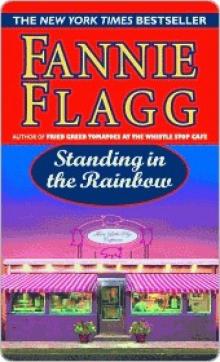 Standing in the Rainbow
Standing in the Rainbow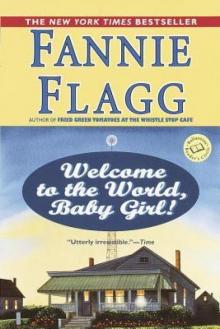 Welcome to the World, Baby Girl!
Welcome to the World, Baby Girl!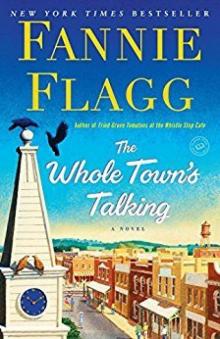 The Whole Town's Talking
The Whole Town's Talking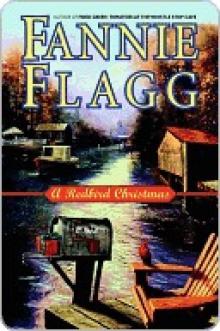 A Redbird Christmas
A Redbird Christmas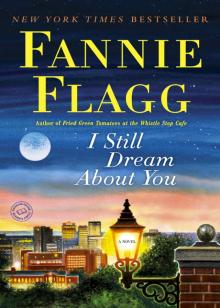 I Still Dream About You
I Still Dream About You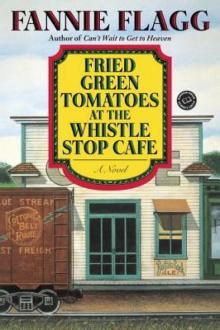 Fried Green Tomatoes at the Whistle Stop Cafe
Fried Green Tomatoes at the Whistle Stop Cafe Can't Wait to Get to Heaven
Can't Wait to Get to Heaven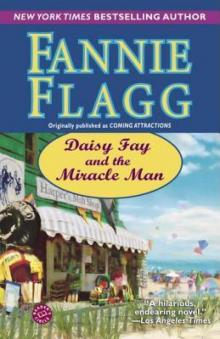 Daisy Fay and the Miracle Man
Daisy Fay and the Miracle Man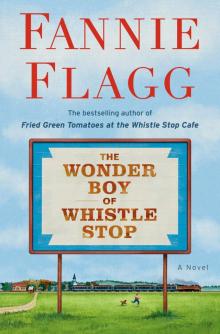 The Wonder Boy of Whistle Stop
The Wonder Boy of Whistle Stop The All-Girl Filling Station's Last Reunion
The All-Girl Filling Station's Last Reunion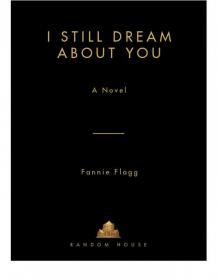 I Still Dream About You: A Novel
I Still Dream About You: A Novel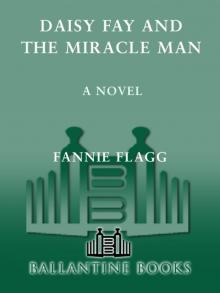 Daisy Fay and the Miracle Man: A Novel
Daisy Fay and the Miracle Man: A Novel